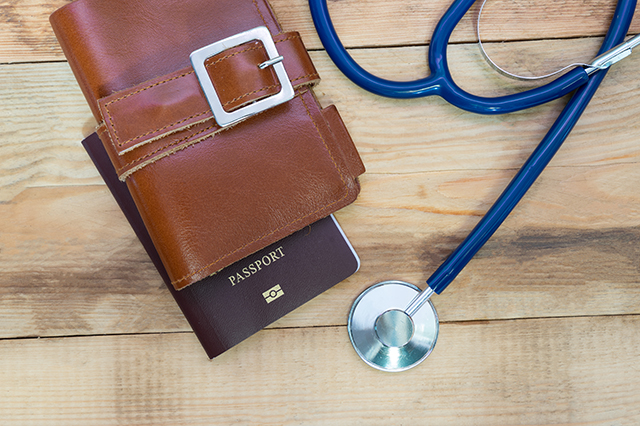You already know that travel insurance is the best buffer between you and taking a financial hit from lost baggage, trip cancellations and rogue tour operators.
But what kind of protection do you have if you get injured or ill abroad? Who pays if food poisoning sends you to the ship’s infirmary on a South Pacific cruise, or if you need stitches after an ill-fated rock climbing tour in Sardinia?
The worst time to discover your own health insurance won’t touch these bills, of course, is after they’re sent to you. To protect yourself and your family, take some time to check out to look into travel health insurance—and see how it’s just as important as the travel insurance that safeguards you from the expense of missed flights and wayward luggage.

Let’s dispel this myth: “I’m already covered.”
According to Travel Professional News, one of the biggest myths about travel insurance is that it’s not necessary; people think their medical coverage travels with them: “Many consumers don’t realize that while they may have great health insurance here in the U.S., many or all of those benefits may not apply the moment they leave the country.”
Your insurer may pay “customary and reasonable” hospital costs abroad, but it’s also possible other benefits don’t apply outside the country. Medical care on a cruise liner, for example, is expensive; you’re paying for onboard convenience as well as care. Your care will be billed to you directly, and you’ll have to sort things out with your insurer when you get home.
What about medical care in countries with socialized medicine, such as the U.K? Wouldn’t it be free for a visitor, as well? “The answer to this straightforward is a bit complicated,” notes the travel website Trip Savvy. “Maybe, but probably not.” In general, immediate emergencies are covered, but you can rack up hefty charges afterwards in post-emergency treatment and medicine.
(Seniors note: Except in rare occasions, Medicare does not cover charges incurred outside the U.S. Check with Medicare.gov for details.)
Things to consider about travel health insurance
It pays to research your own health care insurance carefully to see what would and would not be covered on an international trip.
One major expense that is not generally covered is medical evacuation—and while medevac seems like an extremely unlikely scenario for a golfing trip or museum trek, remember that all it takes to require medevac is that proper medical staff or the equipment you need is not nearby and available. Travel medical insurance can cover this expense, but—as always—read the fine print. Some policies may cover “up to $20,000” but medical evacuation can easily cost between $50,000 to $100,000.
Other lookouts include pre-existing conditions and adventure activities. Pre-existing coverage is available in some cases, but it’s important to read the policy carefully to see where you may (or may not) be covered. The same goes for high-risk activities, such as zip-lining, rock climbing and scuba diving. Be sure the activities you plan to engage in are specifically covered, or find an additional hazardous activity waiver.
(Imbibers note: Injuries sustained while under the influence of drugs or alcohol will not be covered by most policies.)
An ounce of prevention
As with any type of insurance, the hope is that you’ll never need travel insurance. But even with the most robust travel health insurance protection, it’s wise to practice some preventative care.
- Check the U.S. State Departments “Alerts and Warnings” page for current information on your destination, and enroll in STEP (Smart Traveler Enrollment Program) to receive updates and stay connected in the event of a crisis.
- Check in the CDC’s Travelers’ Health page for vaccination info, travel notices, and helpful mobile apps you can download.
- If you’re traveling to a non-English speaking destination, have useful medical information translated into the local language, from food and drug allergies to medical conditions that may affect emergency critical care.
The bottom line
Whether you’re planning a leisurely golfing trip to Scotland or thrilling skydive expeditions in New Zealand, you’ll want to protect yourself with travel health insurance.
- Before the trip: Be sure that the insurance you buy covers your needs to your satisfaction. Reading the fine print can help save hassles and expense down the line.
- During the trip: Be sure you have all the information handy, always—from your insurance papers and the numbers to call to important health information translated into the host country’s language—and have duplicates stored in a file hosting service such as Dropbox.
Do you have a personal story about travel health insurance saving the day—or a cautionary tale about a lack of it? Feel free to share your insights in the comments section below.
For all things travel-related, go to AAA.com/Travel.














